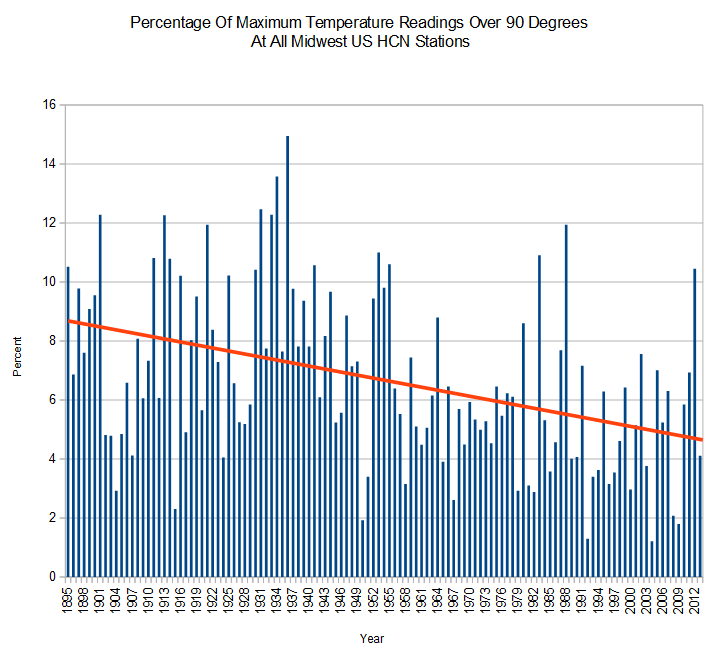The percentage of afternoons over 90 degrees in Minnesota, Wisconsin, Illinois, Iowa, Missouri, Michigan, Indiana and Ohio has dropped dramatically since 1895.
Disrupting the Borg is expensive and time consuming!
Google Search
-
Recent Posts
- Analyzing The Western Water Crisis
- Gaslighting 1924
- “Why Do You Resist?”
- Climate Attribution Model
- Fact Checking NASA
- Fact Checking Grok
- Fact Checking The New York Times
- New Visitech Features
- Ice-Free Arctic By 2014
- Debt-Free US Treasury Forecast
- Analyzing Big City Crime (Part 2)
- Analyzing Big City Crime
- UK Migration Caused By Global Warming
- Climate Attribution In Greece
- “Brown: ’50 days to save world'”
- The Catastrophic Influence of Bovine Methane Emissions on Extraterrestrial Climate Patterns
- Posting On X
- Seventeen Years Of Fun
- The Importance Of Good Tools
- Temperature Shifts At Blue Hill, MA
- CO2²
- Time Of Observation Bias
- Climate Scamming For Profit
- Climate Scamming For Profit
- Back To The Future
Recent Comments
- Gordon Vigurs on Analyzing The Western Water Crisis
- Bob G on Analyzing The Western Water Crisis
- Bob G on Analyzing The Western Water Crisis
- Bob G on Analyzing The Western Water Crisis
- Mike Peinsipp on Analyzing The Western Water Crisis
- Bob G on Analyzing The Western Water Crisis
- Bob G on Analyzing The Western Water Crisis
- Robertvd on Analyzing The Western Water Crisis
- Bob G on Analyzing The Western Water Crisis
- conrad ziefle on Analyzing The Western Water Crisis



MIT Professor & US Experts: Japan “must act now to seal Fukushima reactors, before it’s too late” — Concern US to be affected by “explosions – a chain reaction, engulfing reactors one to four” — “Situation is dynamically degrading and unstable” — Aircraft can likely entomb plant in 6 months
http://enenews.com/mit-professor-us-experts-japan-must-act-now-to-seal-fukushima-reactors-before-its-too-late-concern-us-to-be-affected-by-explosions-a-chain-reaction-engulfing-reactors-one-to-four
Never forget that the Luddites that want to push the world back to the 1800s technology wise (and kill off 90% of the current population.) see Fukushima as a God sent propaganda opportunity.
The World Nuclear Organization, who I generally use as a reasonable source of information has this:
http://www.world-nuclear.org/Features/Fukushima/Situation-at-Fukushima/
The newest news: http://www.world-nuclear-news.org/taghub.aspx?tagid=Fukushima
From that page you get:
I see nothing to indicate anything but an ongoing clean-up. Certainly not any “The Sky is falling ” round in circles scream and shout.
I live in sw ohio and I used my pool heater more last summer than my AC so I believe this. That last year was the hottest on record, that I don’t believe, unless someone is cooking the books!